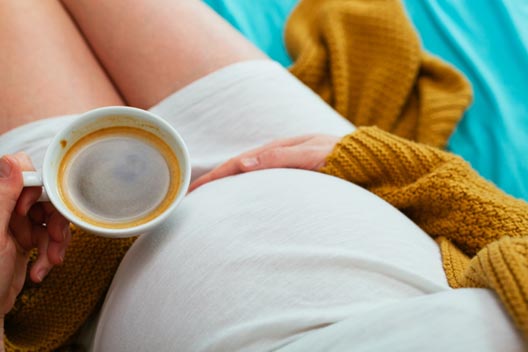
For most couples, deciding to conceive a child is a conscious decision. You’ve daydreamed about your little one, possible even thought about names, taken a look at your finances, and maybe you’ve even shared your decision with a few close family members, or friends. As the possibility of becoming pregnant takes shape, you very likely have made some lifestyle choices to ensure you’re at your optimum health.
Women who make a concerted effort to adopt healthier lifestyle choices may find giving up certain vices difficult, but necessary. The wine glasses go into the cupboard, with a sigh, and your favorite sushi restaurant is off limits for a while. Are these really necessary? Probably not. But what about coffee, or your favorite caffeinated beverages? Should you limit your caffeine intake, or halt it altogether?
How Caffeine Impacts Your Ability to Conceive
The evidence that caffeine affects your fertility in a negative way is sparse, at best. A study done in 1988 suggests that drinking more than the equivalent of caffeine found in 1 cup of coffee (roughly 85 mg) cuts a woman chances for conception by 50%. No other study since has been found to support this claim, and the results of other similar studies show a more complicated relationship between caffeine consumption and fertility.
Women who consumed more than 300 mg of caffeine per day were found to be just as likely to conceive a child as those who drank 100 mg, or less, or consumed no caffeine at all. Women who drank 2 or more cups of tea per day were found to actually be more likely to conceive as those who did not. And, finally, women who consumed soda had the lowest rates of fertility in the study, with the lowest rates being those drinking more than 3 sodas per day.
What are the implications of these findings? Well, you can’t automatically say sodas prevent pregnancy, or tea promotes conception. It’s much more complicated than that. Tea drinkers, on average, have healthier lifestyles, eat a cleaner diet, and soda drinkers may consume more processed foods. Overall, lifestyle seems to have a bigger impact on your fertility than caffeine alone.
Caffeine Has an Impact on Pregnancy
While studies offer conflicting evidence when it comes to caffeine and your fertility, it’s wise to limit your consumption of caffeine when you’re actively trying to become pregnant. Excessive caffeine has been linked to an increased risk of miscarriage, especially in early pregnancy, and consuming high levels of caffeine can result in low birth weight babies.
Caffeine is also a known stimulant, which is why most people can’t face the day without their morning “dose”. The jolt you experience in alertness, attributed to caffeine, also causes your blood pressure to spike. If you already deal with elevated blood pressure, you may be at risk for pre-eclampsia, a dangerous condition of pregnancy.
Caffeine Affects Men as Well
While a few cups of coffee, tea, or cola aren’t known to have an impact on the father’s fertility, caffeine in excessive amounts, such as that found in 4-6 cups of coffee per day (400 mg) or more can lower sperm counts. Regular doses of caffeine in high amounts can also affect the quality of the sperm, so it’s best for dad-to-be to limit his caffeine intake.
How to Cut the Caffeine
If the very thought of facing your day without a jolt of caffeine makes you crazy, look into other ways to feel energized and ready for whatever comes your way. Try meditation after you wake up. Yoga can help clear your mind, and a clear mind is easier to focus. Need a mid-day “pick me up”? Try some sparkling water, or a non-caffeinated tea, such as rooibos (excellent for boosting your immune system) or soothing chamomile.
If you’ve been enjoying caffeinated beverages awhile, you’ll very likely experience withdrawal, typically in the form of a headache. You’ll be tempted to take something to squelch your pain, but try to limit your use of pain relievers. If you are actively trying to become pregnant, you should only use acetaminophen (the main ingredient in Tylenol), and stay away from ibuprofen, naproxen sodium, and aspirin.
All in all, cutting caffeine, and making healthy lifestyle choices, is a responsible endeavor. Making the decision to do what’s best for your baby’s health, as well as your own, already makes you an excellent parent.










